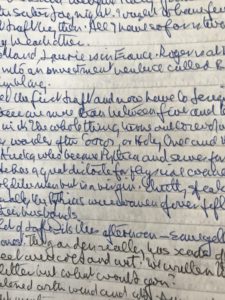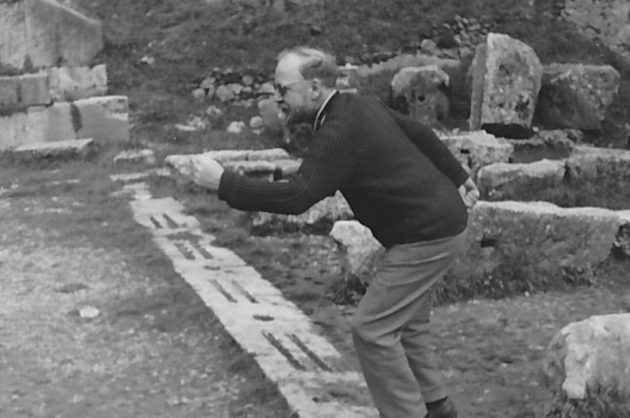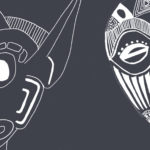Faber & Faber have recently released a new edition of Golding’s posthumously published novel, The Double Tongue, featuring an introduction by Bettany Hughes. In these exclusive extracts from Golding’s unpublished Journals, we can trace the development of the story in the last year of Golding’s life.
6/1/93
I had what seemed like a good idea the other night – a novel about the long and finally tragic relationship between Athens and Plataea. But its real virtue (if any) would be seeing it through the eyes of an old, old plataean hoplite – perhaps one who actually took part at Marathon. This stuff about Pheidippides – did they have no cavalry, or not even a horse? One should go into all that. I recognise the necessity of getting the news – “They’re coming round the bend!; gasp, gasp, dies – to Athens, but why a runner? Of course it’s said that a man can outrun a horse, but not a succession of horses!
Although Golding changed his mind from this initial idea, it seemed to provide the inspiration for setting his next story in ancient Greece.
14/1/93
A splendid set of ideas! We lean heavily on the delphic idea. This lets her become the Pythia after her first desperate effort to escape. As for the college of priests at Delphi – “Dont be frightened little girl. You are quite safe. I am so to speak, the warden of all these souls – you must think of yourself as simply part of the establishment. The only trouble with this is that I get into geographical difficulties. However the isthmus has two coasts.
Eight days after the initial entry, Golding had refined the idea to focus on the Pythia. In an entry on 5/2/93, he named the story as The Double Tongue.
11/2/93
A stint. I’ve also had a plot idea – almost an illumination. It is working already. One has to grab these ideas. Otherwise they vanish. A further idea is to limit the historical specificity. A police report. On the other hand one has to sketch in the spread of the Romans.
In his Journals, Golding always referred to his writing time as a ‘stint’.
12/2/93
Another five stints and I can get on to construction et cetera. Where my work requires a divagation from historical truth, it will get this, how shall I say, indulgence. A novel is only free when it has that. I must make the difference between the officially inspired and officially uninspired! An oracular utterance. I dont [sic] know what I’m doing really. But some things turn and if I use my knack properly will sort out. It is multi purpose, multi-choice and I will never jeer at novelists getting their history wrong, again.
A fascinating entry, which really sums up Golding’s approach to writing. For Golding, exact historical truth mattered less in fiction, which is also the case in his writing of The Inheritors and The Spire.
18/2/93
I’ve finished the first draft and now have to design the second. I doubt that there are more than between five and ten thousand good words in it. The whole thing turns out to revolve round the couple Ionides, warden of the ͑οσιοι [holy ones], or Holy Ones and High priest of Apollo and Arieka who became Pythia and serves for more than sixty years. He has a great distaste for physical women – she would probably like men but is a virgin. Strictly speaking she need not be but generally the Pythias were women of over fifty and living apart from their husbands.
Golding had completed the second draft of The Double Tongue in early June 1993 and thought that it would probably need a third draft. However, Golding died on 19th June. His first draft was published in June 1995 and for the first time, readers could experience one of Golding’s novels before revision.
The Double Tongue is available to buy from Faber.



